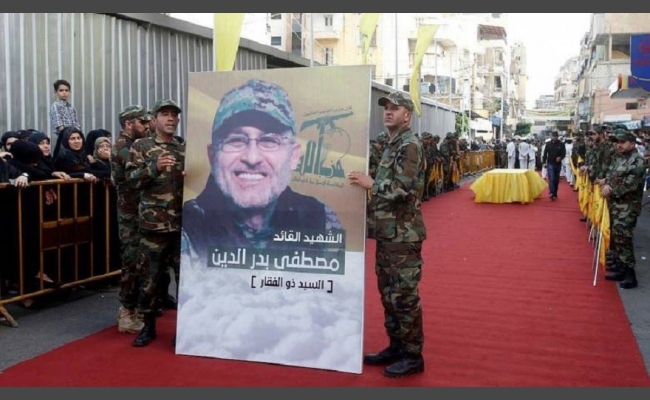There is no doubt that the death of Hezbollah’s general military commander for its forces in Syria, Mustafa Badreddine, last Friday morning was a fierce blow to the Shiite militant group and political party. Its security agencies have stood powerless before similar incidents since 2008, when Imad Mughniyeh was assassinated, followed by his son Jihad Mughniyeh, Abu Mohamed al-Aqleem, Samir al-Kuntar, and Alaa al-Bosna; all of them frontline leaders in the organization.
As the number of Hezbollah fighters killed in Syria exceeds 1,200, including a large number of prominent leaders, some of them killed in direct Israeli air strikes, the number of its forces on Syrian territory has reached about 7,000 fighters spread across various active fronts, especially against the opposition in Aleppo, the Homs countryside, Qalamoun, and the eastern Ghouta.
Returning to Mustafa Badreddine’s killing — and the political and military role he enjoyed — justifications from Hezbollah’s leadership and media varied and included a number of different stories. Most Hezbollah media websites hurried to accuse Israel of being behind the presumed “assassination.”
But Hezbollah backed down from its accusations against Israel in a statement on Saturday, saying that the explosion that killed Badreddine resulted from artillery fire by what it described as “takfiri” (hardline Sunni) organizations that hit one of the group’s centers near the Damascus airport.
According to reports, Hezbollah’s decision to revoke its claims is related to Iranian pressure, perhaps to lessen embarrassment for its ally Russia which is still insisting on continuing air coordination between Moscow and Tel Aviv. This is a point Iran can use in its favor in dealing with the Russians if divisions continue and relations worsen between the two allies. This is in addition to the questions which Assad regime loyalists will be asking even before his opponents about the Russian S-400 advanced surface-to-air missile system.
From another angle, Hezbollah has hindered itself from any retaliation the popular base might demand against Israel, which is above Hezbollah’s current capacities, that do not exceed at best blowing up one of Israel’s military vehicles near the border strip. For that reason, Hezbollah prefers to push its popular base again toward the “takfiri” organizations.
Israeli statements were to a large extent harmonious with Hezbollah’s narrative, as the Israel National Security Adviser, former general Yaakov Amidror, said in an interview with military radio that news of the assassination was “good news for Israel.” He said in his interview that “Israel isn’t always responsible for this,” and added, “but from Israel's view, the more people with experience, like Badreddine, who disappear from the wanted list, the better.”
With Hezbollah ruling out the Israeli air raid hypothesis and with the padded and direct Israeli denials, another more convincing story was needed to allow the party to avoid a burden and be less difficult to respond to, and so it accused the Syrian opposition with shelling the area where Mustafa Badreddine was. Notably, the closest point where the opposition is present is the village of Deir al-Asafir in Eastern Ghouta, about 15 kilometers away.
Ironically, the preliminary information from Hezbollah media indicated at a previous time that the “projectile” was not launched from an automatic platform such as a cannon or the like, but had been directed and was linked to an operation that precisely targeted the area, something that requires high-level technical work not available to anyone but developed countries, according to its description.
If we take into consideration that no opposition Syrian military faction in the Damascus suburbs and its countryside has officially or unofficially claimed the “assassination,” then what could Hezbollah’s confirmation of the story of the death of its commander near the Damascus airport be but a planned incident which Hezbollah is using to provoke the feelings of its popular base from a sectarian standpoint to spur continuing support of its holy war in Syria, and start a new confrontation in the suburbs of the Damascus allowing it to take advantage of the divisions between local factions in Eastern Ghouta.
Apart from Hezbollah’s dramatic scenarios, the closest stories to being believable are what the party itself acknowledged days before about losing contact with a number of its fighters present alongside the Iranian Revolutionary Guards in the battles in the Aleppo countryside, specifically Khan Touman. Which means a more likely hypothesis is that Mustafa Badreddine was killed when one of Hezbollah’s bases was hit by preparatory shelling which preceded the large assault by Jaish al-Fatah (Army of Conquest) in the area.
From here, the tears shed by Hassan Nasrallah, the current Secretary-General of Hezbollah, days ago reflect the bitter and unexpected reality resulting for most players lost in the Syrian mire, especially since this steep price which Hezbollah is still paying is directly linked to communications between Hezbollah and its leaders in the capital Tehran, aiming to foil any political or diplomatic project to extend a ceasefire which is desired to be invested in the current conflicts on Syrian territory.
This article was translated and edited by The Syrian Observer. Responsibility for the information and views set out in this article lies entirely with the author.


